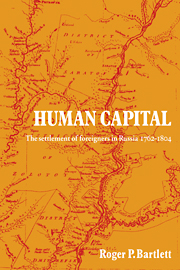Book contents
- Frontmatter
- Contents
- Weights and measures
- Abbreviations
- Preface
- Introduction
- I Antecedents
- 2 Catherine II and the Manifestos of 1762 and 1763
- 3 The response: settlement 1763–1775
- 4 Southern Russia 1764—1796
- 5 Urban and entrepreneurial settlement under the 1763 Manifesto
- 6 Immigration and colonies 1797–1804
- Conclusion
- Appendices
- Notes
- Bibliography
- Index
3 - The response: settlement 1763–1775
Published online by Cambridge University Press: 05 May 2010
- Frontmatter
- Contents
- Weights and measures
- Abbreviations
- Preface
- Introduction
- I Antecedents
- 2 Catherine II and the Manifestos of 1762 and 1763
- 3 The response: settlement 1763–1775
- 4 Southern Russia 1764—1796
- 5 Urban and entrepreneurial settlement under the 1763 Manifesto
- 6 Immigration and colonies 1797–1804
- Conclusion
- Appendices
- Notes
- Bibliography
- Index
Summary
Recruitment
Although criticized by Russian ministers abroad for its vagueness, the 1762 Manifesto did produce some response. It brought Rehbinder's Danzig artisans into Russia; and at the other end of the country the Armenians of Astrakhan used the new proclamation to increase their own numbers. In 1767 they reported that they had translated the 1762 Manifesto into their own language and sent it to ‘our reliable friends’ in Persia, a step which they claimed had been very effective. But it was the second Manifesto, of 1763, distributed in the same way as the first, which marked the serious beginning of recruitment; and the Russian recruiting campaign grew steadily in intensity over the next two and a half years.
However, although Russian representatives abroad now had full instructions, and set actively about the work of finding and engaging emigrants, there were many difficulties. At a time when concern with population was a dominant feature of political theory in Europe, no European state wished to lose its subjects, or to have competition in recruiting new ones. In Turkish territories the considerations which had prevented open publication of the first Manifesto were reinforced by the clause of the second which envisaged the enserfment of Muslims. Austria, in her role both of Balkan and European power, took a hostile view of Russian competition for her Hungarian settlement programme: she not only forbade the publication of the second Manifesto, but in 1762 and 1763 issued decrees renewing an existing ban on emigration from Hungary.
- Type
- Chapter
- Information
- Human CapitalThe Settlement of Foreigners in Russia 1762–1804, pp. 57 - 108Publisher: Cambridge University PressPrint publication year: 1979



